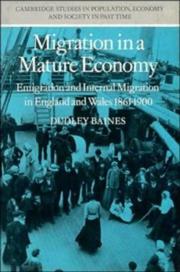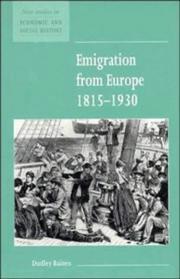| Listing 1 - 6 of 6 |
Sort by
|

ISBN: 052130153X 052189154X 051156032X Year: 1985 Publisher: Cambridge Cambridge University Press
Abstract | Keywords | Export | Availability | Bookmark
 Loading...
Loading...Choose an application
- Reference Manager
- EndNote
- RefWorks (Direct export to RefWorks)
In this study Mr Baines has devised a method of estimating the county of birth of all permanent emigrants from England and Wales in the last four decades of the nineteenth century - some 2.3 million people. He has related the rate and timing of migration to the social and economic characteristics of the counties, which has provided answers to many of the outstanding questions in the history of English emigration, including, for example, the idea of an 'Atlantic Economy' and the extent to which Welsh migration was distinct from or integrated into the English pattern. Briefly, the book concludes that the emigrants did not, in the main, come from 'peripheral' parts of the country. Probably one half of the emigrants had known no environment other than a large town. It is likely that English and Welsh emigrants were more likely to return than emigrants from any European country. Most of the emigrants seem to have been well-informed about the costs and benefits of moving - most probably from the experience of previous emigrants. English emigration could not therefore have been a simple flight from poverty, but was rather based on a well considered decision to leave home, although not necessarily for ever.
Migration. Refugees --- History of the United Kingdom and Ireland --- anno 1800-1899 --- Great Britain --- #SBIB:39A6 --- #SBIB:314H250 --- #SBIB:314H150 --- Migration, Internal --- -Internal migration --- Mobility --- Population geography --- Internal migrants --- Etniciteit / Migratiebeleid en -problemen --- Migratie: algemeen --- Historische demografie en demografische historiek: algemeen --- History --- -Wales --- England --- Emigration and immigration --- -History --- -Emigration and immigration --- -Sources. --- -Etniciteit / Migratiebeleid en -problemen --- Internal migration --- Wales --- Cambria --- Cymric --- Gwalia --- Cymru --- England and Wales --- Angleterre --- Anglii︠a︡ --- Inghilterra --- Engeland --- Inglaterra --- Anglija --- Arts and Humanities --- EMIGRATION ET IMMIGRATION --- GRANDE-BRETAGNE --- CONDITIONS SOCIALES --- 19E SIECLE --- Émigration et immigration
Book
ISBN: 0333520874 Year: 1993 Volume: *1 Publisher: Hampshire Macmillan Distribution Ltd.
Abstract | Keywords | Export | Availability | Bookmark
 Loading...
Loading...Choose an application
- Reference Manager
- EndNote
- RefWorks (Direct export to RefWorks)
314.74 <4> --- Buitenlandse migratie. Emigratie. Immigratie. Remigratie. Repatriering --(demografie)--Europa --- 314.74 <4> Buitenlandse migratie. Emigratie. Immigratie. Remigratie. Repatriering --(demografie)--Europa --- Europe --- Council of Europe countries --- Eastern Hemisphere --- Eurasia --- Emigration and immigration --- History. --- History --- Sources --- America
Article
Abstract | Keywords | Export | Availability | Bookmark
 Loading...
Loading...Choose an application
- Reference Manager
- EndNote
- RefWorks (Direct export to RefWorks)
Article
Abstract | Keywords | Export | Availability | Bookmark
 Loading...
Loading...Choose an application
- Reference Manager
- EndNote
- RefWorks (Direct export to RefWorks)

ISBN: 9780511560323 9780521301534 9780521891547 Year: 1985 Publisher: Cambridge Cambridge University Press
Abstract | Keywords | Export | Availability | Bookmark
 Loading...
Loading...Choose an application
- Reference Manager
- EndNote
- RefWorks (Direct export to RefWorks)

ISBN: 0521552702 0521557836 1139170996 9780521552707 9780521557832 9781139170994 Year: 1995 Volume: 11 Publisher: Cambridge Cambridge University Press
Abstract | Keywords | Export | Availability | Bookmark
 Loading...
Loading...Choose an application
- Reference Manager
- EndNote
- RefWorks (Direct export to RefWorks)
Why did 60 million people leave Europe for overseas destinations in the hundred years after the Napoleonic Wars? What were the social and economic causes and effects of this mass migration? Why did some people emigrate and not others, and why did so many emigrants return to Europe? This short comprehensive survey answers these and other questions regarding emigration from different parts of Europe in the years between 1815 and 1930. Written specifically for undergraduate students, it reviews the current literature in several European languages, summarises both economic and demographic theories, and analyses the relation between economic change in Europe and the emigration rate, as well as discussing the economic effects of immigration on the receiving countries and the social experiences or the immigrants.
History of Europe --- Europe --- Emigration and immigration --- History --- Emigration et immigration --- Histoire --- Migration. Refugees --- anno 1800-1999 --- Arts and Humanities --- Council of Europe countries --- Eastern Hemisphere --- Eurasia --- History. --- Europe - Emigration and immigration - History
| Listing 1 - 6 of 6 |
Sort by
|

 Search
Search Feedback
Feedback About UniCat
About UniCat  Help
Help News
News